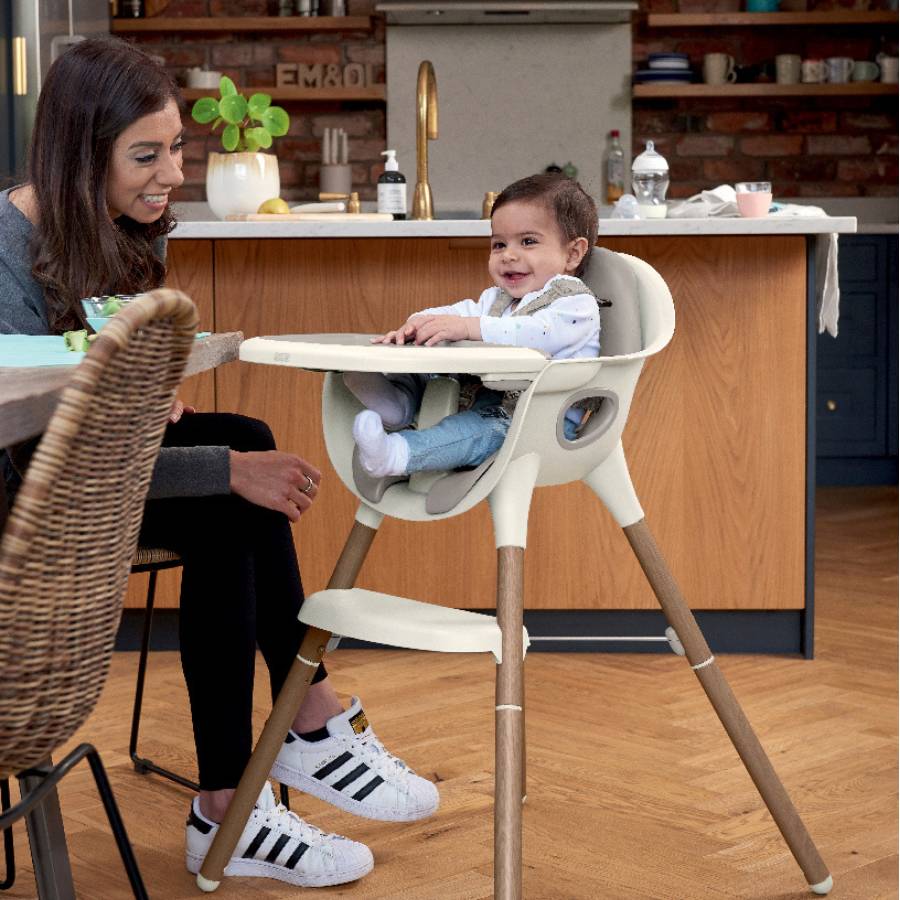
Why introduce solid foods at 6 months?
Introducing solid foods at around 6 months of age is recommended by pediatricians and nutrition experts for several reasons:
- Nutritional Needs: Breast milk or formula alone may not suffice to meet all your baby's nutritional requirements as they grow older. Introducing solids ensures they receive essential nutrients such as iron, zinc, and vitamins.
- Developmental Milestones: At 6 months, babies start showing signs of readiness for solid foods, such as sitting up with support and showing interest in what you're eating.
- Texture Exploration: Introducing a variety of textures at this stage helps in developing oral motor skills and preventing feeding difficulties later on.

Weaning for babies
Weaning marks a significant transition in your baby's feeding journey, signaling the gradual shift from exclusive reliance on breast milk or formula to a diverse diet of solid foods. It's a gradual process that requires patience and attentiveness to your baby's cues. Start by replacing one breastfeed or formula feed with a small serving of solids, ideally at a time when your baby is calm and alert.
Introduce a variety of flavors and textures, gradually increasing the frequency and quantity of solid foods while reducing milk feeds over time. Be prepared for some trial and error as your baby explores new tastes and textures, and don't be discouraged if they initially show resistance.
Offer plenty of encouragement and praise for their efforts, creating a positive mealtime environment. Remember, every baby is unique, so tailor the weaning process to suit your baby's individual needs and preferences.

The best first foods for babies 6 to 9 months
-
Single-Ingredient Purees: Start with simple, single-ingredient purees to introduce new flavors gradually. Opt for avocado, sweet potato, banana, and peas. These foods are gentle on the stomach and rich in essential nutrients.
-
Iron-Rich Foods: Iron is crucial for your baby's cognitive development. Introduce iron-rich foods like cooked and pureed meats (chicken, beef, lamb), fortified cereals, and cooked lentils or beans.
-
Soft Fruits and Vegetables: Soft fruits and vegetables are excellent choices for babies exploring new textures. Consider mashed ripe fruits (apple, pear), steamed and mashed carrots, and cooked squash or pumpkin.
-
Baby Cereals: Fortified baby cereals are a convenient option to ensure your baby receives essential nutrients like iron and zinc. Mix them with breast milk, formula, or water for a smooth consistency.
-
Yogurt and Cheese: Introduce plain, full-fat yogurt and soft cheeses as sources of calcium and probiotics. Ensure they're plain and unsweetened to avoid added sugars.

Finger foods for babies
As your baby becomes more adept at picking up objects and exploring textures, introducing finger foods is an excellent way to encourage independent feeding and enhance their fine motor skills. Opt for soft, easily graspable foods such as cooked pasta pieces, steamed carrot sticks, ripe avocado slices, and soft fruit chunks. These finger foods not only provide essential nutrients but also allow your little one to practice self-feeding, fostering a sense of autonomy and confidence.
Supervise closely during this stage to prevent choking hazards and ensure a safe and enjoyable experience for your baby. Gradually introduce a variety of finger foods, observing your baby's preferences and reactions to different textures and flavors. Remember, mealtime should be a fun and interactive experience for both you and your baby, promoting healthy eating habits from the start.

Quick homemade recipes for 6-9 month olds
- Whole grain waffles
- Soft scrambled eggs
- Hummus on soft crackers
- Baked sweet potatoes
- Well-cooked rice and chicken
- Pasta with boiled vegetables
- Yogurt mixed with mashed berries
- Egg yolk omelet
- Banana oatmeal mash
- Apple cinnamon rice porridge

Important considerations
- Allergen Introduction: Introduce potential allergens one at a time, observing for any adverse reactions. Common allergenic foods include peanut butter, eggs, shellfish, and tree nuts.
- Consistency: Start with smooth purees and gradually progress to mashed and finely chopped foods as your baby becomes more comfortable with textures.
- Feeding Schedule: Offer solids once a day initially, gradually increasing to two or three times a day as your baby's appetite grows.

Introducing solids to your baby's diet is an exciting milestone, marking the beginning of their culinary journey. By offering a variety of nutritious foods, you're laying the foundation for healthy eating habits later in life. Remember to monitor your baby's cues, celebrate their progress, and enjoy this bonding experience together. For a wide range of baby products including feeding essentials, high chairs, and more, explore the offerings at Mamas & Papas.
- Explore our range of baby feeding essentials for a hassle-free feeding experience.
- Check out our collection of high chairs designed for comfort and safety during meal times.
By incorporating these nutrient-rich foods into your baby's diet, you're nurturing their growth and development while fostering a love for healthy eating habits.









